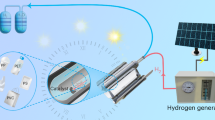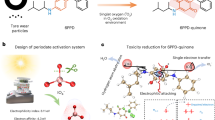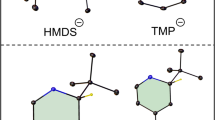Abstract
IT is now generally accepted that the skeletal part of humic acids consists of heteropolycondensates of various aromatic nuclei. This concept, however, has been deduced rather indirectly from physico-chemical data such as X-ray analysis, and benzene seems to be the sole aromatic ring identified by the method of organic chemistry1. Recently we found anthraquinone in the decarboxylation products of the water-soluble acid fraction obtained by the alkaline permanganate oxidation of humic acids.
This is a preview of subscription content, access via your institution
Access options
Subscribe to this journal
Receive 51 print issues and online access
$199.00 per year
only $3.90 per issue
Buy this article
- Purchase on Springer Link
- Instant access to full article PDF
Prices may be subject to local taxes which are calculated during checkout
Similar content being viewed by others
References
Flaig, W., Landw. Forsch., 6 Sonderheft, 94 (1955).
Kumada, K., Soil and Plant Food, Japan, 1, 29 (1955).
Montgomery, R. S., and Holly, E. D., Fuel, 35, 49, 60 (1956).
Author information
Authors and Affiliations
Rights and permissions
About this article
Cite this article
KUMADA, K., SUZUKI, A. & AIZAWA, K. Isolation of Anthraquinone from Humus. Nature 191, 415–416 (1961). https://doi.org/10.1038/191415b0
Issue Date:
DOI: https://doi.org/10.1038/191415b0
Comments
By submitting a comment you agree to abide by our Terms and Community Guidelines. If you find something abusive or that does not comply with our terms or guidelines please flag it as inappropriate.



